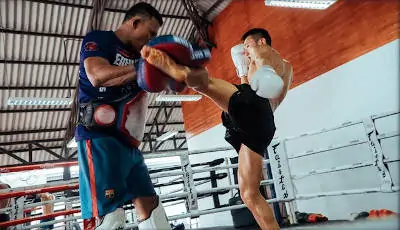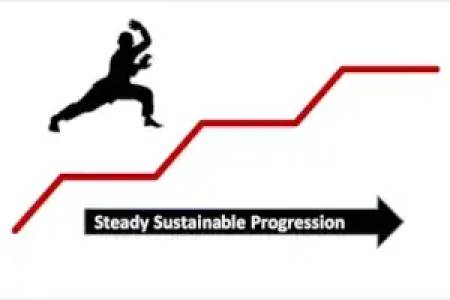If you are a Martial Artist, chances are that you would have had to test your combative skills against an opponent. Regardless of your level, there are always feelings of nervousness and anxiety. You may feel fear because you are new to combat, or it may be that the intensity of fighting increases as you reach higher levels.
This fear is completely warranted as there is a good chance that you will be physically hurt in the confrontation.
I have certainly been there, and I can empathise with the person in both situations. It is a daunting task to face another human being who is skilled enough to inflict harm upon you. However, it is much better to be in this position in a controlled environment instead of a real-life situation. If anything, exposure to this type of combat will prepare you in the event that you need to call upon your Martial Art to defend yourself or others against an aggressor.
Over the years, I have developed many strategies to deal with this type of fear and anxiety. I’d like to share these with you and hopefully help you on your way to progressing in this sphere of your Martial Arts practice.
Accept how you feel
As human beings, we are designed to experience stress, anxiety and an increase in adrenaline during times of danger. Undoubtedly, a fight is a valid concern and a source of danger. It is completely normal to feel the way we do when we are about to engage in combat. Accepting how you feel is the first step to regulating these emotions so that you can keep a cool head during the chaos of a fight.
Breathe
I find that taking deep and slow breaths into the belly calms me down. This is something that you can do prior to combat. Once your bout begins make sure that you keep breathing. At this point deep belly breaths are no longer required, and you should allow your body to respond in whatever way it needs to. If it needs short and shallow breaths, then do that.
Exposure
The only way to become comfortable with fighting is to become familiar with it. This means putting yourself into that situation as often as possible. Now, I am not advocating going up to random people or groups and making trouble. This is where sparring in Martial Arts can help you. It is the simulation of a fight with a skilled opponent. This is where you learn:
- to move with an opponent
- how to protect yourself
- how to control your emotions and keep your cool
- to develop strategies for dealing with different types and sizes of fighters
I have recently learnt about Graded Exposure Therapy. The idea is expose yourself gradually to the situation that causes your fear and anxiety. The key is to ensure that you challenge your comfort zone little by little such that you can manage your fear with each step.
You can start with slow and light sparring with an opponent and as you become accustomed to the level of sparring you can gradually increase the intensity.
Very often, we are fearful of something because it is foreign to us or we feel that we lack control of the situation. You become more familiar with the situation when you expose yourself to it and you start to develop strategies to control the outcome, leading to an improved sense of control.
Condition yourself for an intense fight
Our bodies tend to feel more stress when we are not properly conditioned for a fight. We become tired and this can trigger a more intense stress response which can lead us to feel less control and this in turn triggers more and more stress.
So, incorporate 2 or 3 minutes of intense sparring into your training. If your Martial Art requires multiple rounds, repeat these 2 or 3 intense minutes for as many rounds as required. Imagine an intimidating opponent during this session and this will help condition your mind as well.
This method helps with cardiovascular and mental conditioning, but what about conditioning yourself for strikes from your opponent? This type of conditioning is also important. Stand in a square position and have your sparring partner strike different areas on your body such as the arms, mid-section, chest and legs at random. Start with low-power strikes and gradually increase the power until they become unbearable. What’s really important here, is that your opponent is not trying to inflict any damage to your body but is conditioning your body to take hits that you are likely to receive in a fight. With enough practice you will learn to absorb strikes instead of allowing them to do maximum amounts of damage.

Focus on your mindset not your opponent
It is very easy to psyche ourselves out of performing well during combat. Very often an altercation is already lost if you already believe you have lost. This will happen even if you are highly skilled or in peak physical condition. Believe in yourself and your abilities.
"If the mind is willing, the flesh could go on and without many things." ~ Sun Tzu
Focus on the task at hand instead of your opponent. Your task is to defend against or avoid attacks and try to land as many attacks as you can on your opponent. To move with grace and speed; attack with power, ferocity and accuracy; and not relinquish your position. This needs to happen against any opponent, so what is the point in fixating on who and how good your opponent is? Read about a great concept that relates to fighting well and adopting the mindset of a warrior.
Overcome the fear of Fighting
Build Confidence in your Fighting Abilities
Meditation
Overcome Anxiety
Find your Centre
Improve your Strength and Conditioning
Learn Combat Technique and Strategies
Gain a Deeper Understanding of Yourself

Gain Confidence as a Fighter
I really enjoy the thrill and excitement of testing my Martial Arts skills against an opponent. Even better if my opponent is stronger and more skilled than me. It is an opportunity for me to simulate a threatening situation and test my wits and will to overcome. When the bout is finished, I take away my learnings and thank my opponent for them.
More on Martial Arts

Rules for Success in Karate
Friday, 08 October 2021 18:47I came across an awesome project that was initiated by Les Bubka , an amazing Sensei that seeks to tackle mental health issues and promotes overall well-being through the practice of his Martial Art...

Hung Ga Kuen
Saturday, 04 December 2021 10:56Hung Ga Kuen is a Martial Art that originated in Southern China and has its roots in Southern Shaolin Kung Fu. The Martial Art is characterised by strong stances and a focus on hand techniques.

Making Progress as a Martial Artist
Thursday, 07 October 2021 17:23Martial Arts like any other skill requires a great deal of commitment, time, and patience to succeed and attain proficiency. The more proficient you become, the slower your progress seems to get....
